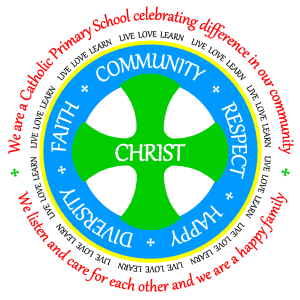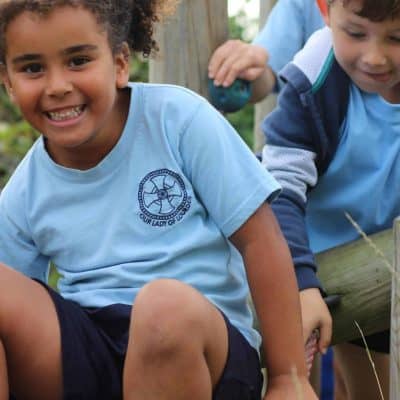Equalities Information
The school also promotes an environment of inclusion and friendship and all of the teaching and other staff promote the same quality values driven from above.
Parent Survey
2021

100% of our pupils in Years 4, 5 and 6 feel like they belong in this school.
Safe and Well
School Survey 2018
Here you find our Equalities Statement and our Equalities Information. You can find our objectives (determined in January 2022) in our Equalities Information and Objectives document. This, and further equalities related policies, can be found on our policies page.
Our Lady of Lourdes Equalities Statement
Our school aims to meet its obligations under the public sector equality duty by having due regard to the need to:
- Eliminate discrimination and other conduct that is prohibited by the Equality Act 2010
- Advance equality of opportunity between people who share a protected characteristic and people who do not share it
- Foster good relations across all characteristics – between people who share a protected characteristic and people who do not share it
Eliminating Discrimination
The school is aware of its obligations under the Equality Act 2010 and complies with non-discrimination provisions.
Where relevant, our policies include reference to the importance of avoiding discrimination and other prohibited conduct.
Staff and governors are regularly reminded of their responsibilities under the Equality Act, for example during meetings. Where this has been discussed during a meeting it is recorded in the meeting minutes.
New staff receive training on the Equality Act as part of their induction, and all staff receive refresher training every September.
The school has a designated member of staff for monitoring equality issues, and an equality link governor. They regularly liaise regarding any issues and make senior leaders and governors aware of these as appropriate.
We work in partnership with parents and carers, children and the whole school community to prevent all forms of bullying and prejudice-based behaviour. Please refer to our Anti-Bullying Policy for details.
All bullying and prejudice-based incidents are recorded. These records, using CPOMS (Child Protection Online Management System) are used to inform the assembly programme and EPR education curriculum and to support and track individual children. Incidents are discussed during meetings and reported to governors. The school also participates in the Brighton and Hove Safe and Well at School Survey annually and this data is also analysed and used to measure impact and inform next steps. This data is reported back to children, staff and governors on an annual basis.
Numbers of bullying and prejudice-based incidents recorded initially increased as a result of staff training and of work with pupils to encourage them to report incidents. We also actively encourage parents and carers to report bullying and prejudice-based incidents to us. Our effective recording has shown there are incidents in the community (like many other schools) of gender and disability discrimination, homophobia and racism.


Advance Equality of Opportunity
Advancing equality of opportunity is important at our school. All groups of children in the school are regularly and rigorously analysed in terms of their attainment and progress. The performance of boys and girls is carefully monitored to identify areas for development. Children from different ethnic groups are also tracked to ensure that any under-performing groups are identified and supported. The same applies to other groups of children, for example children with Special Educational Needs.
As set out in the DfE guidance on the Equality Act, the school aims to advance equality of opportunity by:
- Removing or minimising disadvantages suffered by people which are connected to a particular characteristic they have (e.g. pupils with disabilities, or gay pupils who are being subjected to homophobic bullying)
- Taking steps to meet the particular needs of people who have a particular characteristic (e.g. enabling Muslim pupils to pray at prescribed times)
- Encouraging people who have a particular characteristic to participate fully in any activities (e.g. encouraging all pupils to be involved in the full range of school societies)
- Promoting Equality through the curriculum that we teach. Sensitivity is shown towards children who might be impacted upon by issues or discussions relating to equality and diversity. g. In discussing Martin Luther King, we would be mindful of the diversity in our class and children spoken to beforehand to demonstrate our sensitivity.
- Staff training will be undertaken to remain abreast of current issues pertaining to equality and diversity.
- We would look to embed equality and diversity within our curriculum rather than undertake single periods of ‘celebration’ or reflection for example with Black History month.
- We look to promote equality through our language:
- We will have agreed terminology across the school for staff
- Where terminology is referring to race or skin colour, sensitive and supportive discussions with individual children are essential to identify their preference, to avoid the use of terminology that might cause offence or upset.
In fulfilling this aspect of the duty, the school will:
- Publish attainment data each academic year showing how pupils with different characteristics are performing
- Analyse the above data to determine strengths and areas for improvement, implement actions in response and publish this information
- Make evidence available identifying improvements for specific groups (e.g. declines in incidents of homophobic or transphobic bullying)
- Publish further data about any issues associated with particular protected characteristics, identifying any issues which could affect our own pupils
Fostering Good Relations
In our school we take pride in the range of work we do to foster good relations and 98.7% of pupils agree that the school helps them to get on with others (Safe and Well School Survey 2018).
The school aims to foster good relations between those who share a protected characteristic and those who do not share it by:
- Providing annual staff training on at least one aspect of equality and diversity. Last year we had staff training on race equality when delivering Black History Month.
- Ensuring the whole school environment and curriculum reflects the diverse community within which we live. We aim for all children in our school to see themselves reflected in the stories we read, the assemblies we hold and in our displays and curriculum.
- Giving clear messages about expectations as part of school values and this includes regular assemblies in which we mark, for example Anti-Bullying Week, or opportunities to celebrate commonality and difference pertaining to diversity, taking into account the demographic of the school.
- Constantly reviewing and developing the PSHE Education and through Education for Personal Relationships (EPR) and Relationships and Sex Education (RSE) so that it provides opportunities to explore values and attitudes, understand similarities and differences and builds understanding of different groups and children’s own identities.
- The charity work led by the school and children helps to foster good relations.
- For children who struggle to understand the importance of respect for others we have a range of interventions including small group work, discussions with specialist outside agencies including e.g. Safety Net, DABCEC and the Police.
- Promoting tolerance, friendship and understanding of a range of religions and cultures through different aspects of our curriculum. This includes teaching in RE, citizenship and personal, social, health and economic (PSHE) education, but also activities in other curriculum areas. For example, as part of teaching and learning in English/reading, pupils will be introduced to literature from a range of cultures
- Holding assemblies dealing with relevant issues. Pupils will be encouraged to take a lead in such assemblies and we will also invite external speakers to contribute
- Working with our local community. This includes inviting leaders of local faith groups to speak at assemblies, and organising school trips and activities based around the local community
- Encouraging and implementing initiatives to deal with tensions between different groups of pupils within the school. For example, our school council has representatives from different year groups and is formed of pupils from a range of backgrounds. All pupils are encouraged to participate in the school’s activities, such as sports clubs. We also work with parents to promote knowledge and understanding of different cultures
- We have developed links with people and groups who have specialist knowledge about particular characteristics, which helps inform and develop our approach








